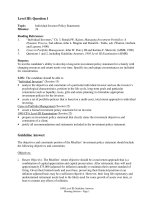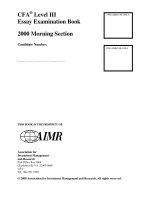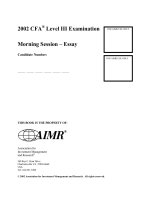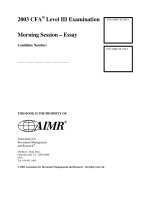Level III SS3 essay quiz 1 solution
Bạn đang xem bản rút gọn của tài liệu. Xem và tải ngay bản đầy đủ của tài liệu tại đây (107.54 KB, 2 trang )
Level III SS 3 Essay Quiz 1 Solution (3 questions, 16 minutes)
Topic: Behavioral Finance. Minutes: 16
Part A
Carolyn has a risk-seeking
seeking (convex) utility function for gains and a risk
risk-averse
averse (concave) utility
function for losses. This is described by the Friedman-Savage Double-Inflection
Inflection utility function
with an inflection point where the function shifts from concave to convex. This type of function
explains why people may take low
low-probability, high-payoff
ayoff risks (e.g. investing in venture
v
capital funds)) while at the same time insuring against low
low-probability,
probability, low-payoff
low
risks (e.g.
investing in TIPS). The concave portion of the utility function explains investing in low
low-payoff
TIPS,, while the convex portion of the function explains venture capital investments.
stments.
Traditional finance theory assumes risk aversion (concave utility function) at all levels of wealth,
which would lead to rejection of all speculative investments having a negative expected return.
Template for Part B
Discuss how Carolyn’s
Behavioral bias
behavior reflects each bias.
i. Anchoring
bias.
ii.
Overconfidence
bias.
Explain how a rational economic
individual in traditional finance
would behave differently with
respect to each bias.
Carolyn exhibits an anchoring
bias as she has anchored a
return of 20% in her mind and
even when market conditions
are not favorable, she is still not
prepared to budge from her
return objective.
A rational economic individual
recognizes the prevailing economic
ec
and market conditions and takes the
best decisions in light of the current
circumstances
cumstances and future forecasts so
that an optimal investment plan can
be achieved.
Carolyn exhibits an
overconfidence bias as despite
the recommendation of her
investment advisor, she
demonstrated unwarranted faith
in her intuitive reasoning and
judgment. She turned down the
advice based on very little
research and trusted her
cognitive abilities more than the
information provided by the
investment
estment advisor.
A rational economic individual:
• Should review his portfolio
performance over at least two years so
that not only does he recall the
winners but also acknowledges all the
losers which he picked based on his
misguided belief in identifying
identifyin a good
investment.
• Should be objective when evaluating
investments and should identify the
reasons behind the results of
investments so that they do not lead to
self-attribution
attribution and overconfidence.
• Should perform a post-investment
post
analysis so that he can separate good
decisions from bad ones.
Copyright © IFT. All rights reserved
www.ift.world
Page 1
Level III SS 3 Essay Quiz 1 Solution (3 questions, 16 minutes)
Part C
Hilton is incorrect that Carolyn’s portfolio allocation is inconsistent with the Mean-Variance
Framework (MVF) and that it has elements of the Behavioral Portfolio Theory (BPT). An MVF
investor constructs portfolios keeping in mind his risk tolerance, investment objectives and
constraints, and circumstances. Carolyn’s portfolio is mean
mean-variance
variance efficient as it incorporates
all of these while also considering the relative correlation of returns be
between
tween different asset
classes.
Hilton is also incorrect in classifying different asset allocations as layers because layers, referred
to in BPT, are mutually exclusive and they do not take into account the relative correlations
between different asset classes.
sses. Simply having bonds
onds as an asset class does not categorize an
investor as someone exhibiting mental accounting bias. A traditional investor can be risk averse
and allocate considerable fraction of his portfolio to Fixed Income Securities. A BPT investor
will have multiple attitudes towards risk depending on whic
which
h part of their wealth is being
considered which is unlike traditional investors
investors.
Copyright © IFT. All rights reserved
www.ift.world
Page 2









